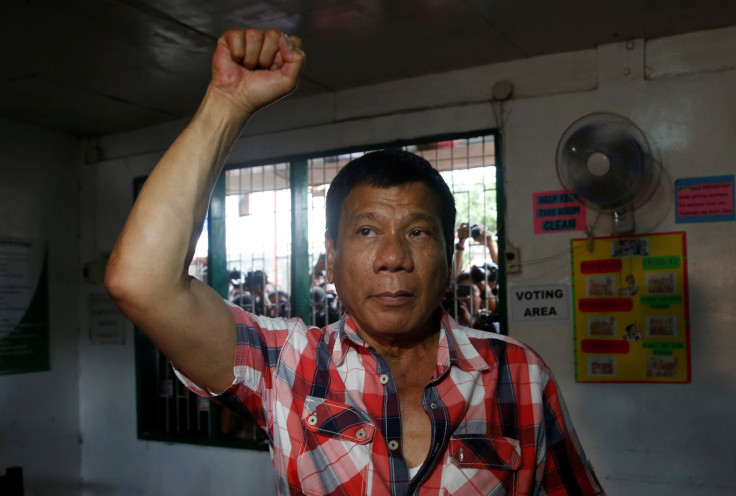Philippines Election: Rodrigo Duterte, Tough-Talking Mayor, Expected To Become President

He asks voters to “forget the laws on human rights” and has boasted about his involvement in at least hundreds of extrajudicial killings of criminals while he was mayor. He made comments about wanting to rape an Australian missionary and called Pope Francis “son of a whore” when the pontiff’s visit caused a traffic jam in Manila. He is a self-confessed womanizer who admits taking Viagra and has vowed to ride a jet ski to a disputed island that China claims in the South China Sea to personally stake the Philippines’ claim. Rodrigo Duterte is also the front-runner to become the country’s next president.
As the Philippines holds elections to various posts Monday, including the president and vice president, the tough-talking former mayor of Davao City is widely expected to win the presidency and replace outgoing President Benigno Aquino. Duterte, who governed Davao City for 22 years — one of the longest-running mayors in the country — has wooed supporters with his hard-line stance on crime and corruption.
Victoria Monserat, a mother of three, told the Wall Street Journal, while she queued to vote in Quezon City, that the Philippines needed a leader like the first prime minister of Singapore.
“We need discipline. Look at Singapore. It is where it is because of the discipline imposed by Lee Kuan Yew. We need to stop corruption, stop crime, the drug problem for my yet-unborn grandchildren,” she said.
The presidential election is a five-way race, however, and Aquino, who has called Duterte a dictator-in-waiting, appealed for the other four candidates to unite against the former mayor. He hoped Sen. Grace Poe, former international criminal court judge Miriam Santiago and his Vice President Jejomar Binay would support his preferred successor, Manuel Roxas, but the other three balked at the proposal.
According to a survey reported by the Agence France-Presse, Duterte was leading the polls by an 11-point margin over his rivals ahead of voting day. Poe and Roxas were tied in second place, while former favorite Binay was at fourth place.
Aquino’s term as president (the Philippines limits presidents to a single 6-year term) was notable for the economic growth of the country, which expanded at an average of 6.2 percent annually from 2010, according to the Associated Press, and he has also been lauded for trying to tackle rampant corruption. But his critics have blamed him for continuing a model that favors a small clique of elite business families who control most of the country’s key industries, leading to one of Asia’s widest divides between the haves and have-nots.
Duterte has not focused on the economy in his campaign, choosing instead to talk about law and order issues, as well as rooting out corruption. His showcase is his work as mayor of Davao City, which under his rule, turned from a city with one of the highest homicide rates in the world to a safe and law-abiding place with a prosperous business district. He says that if elected, he will rid the country of corruption and illegal drugs in six months. Duterte is also openly supportive of LGBT rights and has said he would legalize gay marriages.
The country’s election commission is using computerized voting machines this election, and officials said the result could be known by as early as Monday evening, after voting ends at 5:00 p.m., local time (5:00 a.m. EDT). The Philippines has over 54 million registered voters, and about 80 percent were expected to cast their ballot.
Political violence around elections is commonplace in the South Asian island nation, and at least 22 people, including a mayoral candidate, have been killed in the last few days.
© Copyright IBTimes 2024. All rights reserved.





















